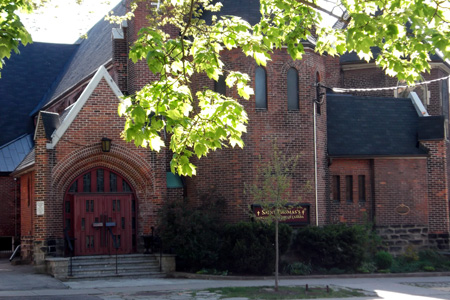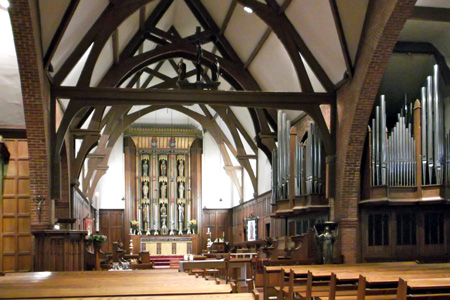| |
 |
 |
 |
| Comment on this report, or find other reports. |
 |
| Our Mystery Worshippers are volunteers who warm church pews for us around the world. If you'd like to become a Mystery Worshipper, start here. |
 |
| Find out how to reproduce this report in your church magazine or website. |
|
|
| 2374: St Thomas's,
Toronto, Ontario, Canada |
 |
 |
 |
Mystery
Worshipper: Paterfamilias.
The church:
St Thomas's,
Toronto, Ontario, Canada.
Denomination:
Anglican Church
of Canada, Diocese
of Toronto.
The building:
A smallish structure, a fine example of the Arts and Crafts
style in red brick, dating from 1893. The baptistery was added
in 1919 as a memorial to the First World War. There is some
fine stained glass and a reredos behind the high altar depicting
nine saints who are associated with the growth of the Anglican
Church.
The church:
St Thomas's prides itself on its high liturgical and musical
standards. The parish has made a strong commitment to its music
program and to Christian formation. A glance at the Sunday service
leaflet gives a bird's-eye view of the parish's extensive activities.
Clearly there is much going on in the life of this parish. There
are five services each Sunday, and three different choirs support
the liturgies of the sung services.
The neighbourhood:
Toronto is the capital of the province of Ontario, and is also
the largest city in Canada. It is home to the Toronto Stock
Exchange; professional sports teams in baseball, hockey, and
football; a highly-respected symphony orchestra and opera company;
and a lively theatre scene. St Thomas's is north of downtown
Toronto, on the western edge of the University of Toronto's
downtown campus. The immediately surrounding neighbourhood features
older homes, other churches, and schools.
The cast:
The Revd Mark W. Andrews, rector, preached; no other participants
in the service were listed in the service leaflet. I surmise
that John H. Tuttle, organist and choirmaster, was at the organ.
The date & time:
Fourth Sunday after Easter Day (although the propers were those
of the Fifth Sunday of Easter in the Revised Common Lectionary),
May 6, 2012, 9.30am.
Comment: We
have received a comment
on this report.
What was the name of the
service?
Sung Eucharist.
How full was the building?
There were 17 of us in the nave, and perhaps a dozen more in
the chancel (clergy, choir, acolytes). I would estimate the
church seats about 350.
Did anyone welcome you
personally?
A sidesperson handed us all of the materials we would need for the service: the seasonal leaflet, the Sunday leaflet, the bulletin, and the readings for the day. The Sunday leaflet included the order of service for all of the five Sunday services.
Was your pew comfortable?
Wooden, moderately comfortable. Fold-down kneelers were under
the pew below.
How would you describe the pre-service
atmosphere?
Quiet and reverential.
What were the exact opening words of the
service?
"Alleluia! Christ is risen!" to which we responded, "The Lord
is risen indeed. Alleluia!"
What books did the congregation use during the
service?
A Hymn Book and the Book of Common Prayer (1962)
were in the pews. The latter was not used; the seasonal leaflet
had the appropriate texts from the Book of Alternative Services
(1985), along with the service music for the eucharist
(William Mathias' Gloria, Sanctus and Benedictus, and
Agnus Dei).
What musical instruments
were played?
A three-manual pipe organ, restored from previous instruments
by the Québec firm of Guilbault-Therien in 1991.
Did anything distract
you?
There was a babe in arms who seemed to have some objection to
Father Andrews' sermon; at one point, he duly noted the objection
and appreciated that it came as he was describing gnostic heresies.

Was the worship stiff-upper-lip,
happy clappy, or what?
Fairly formal. St Thomas celebrates its early and late masses
ad orientem, with full ceremonial for the 11.00; for
this service, a portable altar had been rolled out in front
of the chancel to permit a versus populum celebration.
Except for the celebrant being vested in chasuble, and the sursum
corda and preface being chanted, there was little indication
of the Anglo-Catholic ethos that St Thomas's is famous for;
ceremonially it was no fuss, no muss. There was certainly nothing
that could be considered happy-clappy.
Exactly how long was the sermon?
11 minutes.
On a scale of 1-10, how
good was the preacher?
8 – Fairly straightforward, certainly no eccentricities.
Father Andrews preached from a lectern that had been set up
in front of the portable altar, and seemed to be reading from
a prepared text. But I couldn't help but wonder if the sermon
might not be a condensed version of the one intended for the
11.00 service, as it was based on the first and second readings
but not the gospel reading.
In a nutshell, what was
the sermon about?
The rector's texts were Acts 8:26-40 (Philip instructs and baptizes
the Ethiopian eunuch) and 1 John 4:7-21 (God is love). The eunuch
(we might better relate to him as the court official in charge
of Ethiopia's treasury) was a man of faith with an inquiring
mind. His journey of faith was extraordinary, and he was open
to what Philip would preach to him. But John was preaching to
a congregation from whom a segment had broken away, and thus
they needed encouragement. The group that had left the congregation
were probably gnostics, and John uses the language of gnosticism
to refute their doctrines.
Which part of the service
was like being in heaven?
The care which this congregation devotes to their liturgical
worship, and the wonderful motet (the British composer John
Frederick Paynter's Come My Way, My Truth, My Life)
sung by the small, but expert, choir.
And which part was like
being in... er... the other place?
Well, perhaps not hellish, but perhaps purgatorial? First, I
find it totally frustrating to have to deal with a hymnal that
has not a single note of music in it. Perhaps more relevant,
though, is that I constantly had the sense that all involved
were acutely aware that this service could not go more than
a minute or two over 50 minutes (so that mattins could begin
at 10.30). There was no opening hymn (choir and clergy entered
during the prelude); no offertory collection (an offertory plate
was at the back of the church, and brought up immediately as
the offertory began); hymns began with a single-phrase introduction;
and there was no postlude (simply a brief, quiet improvisation
that served as travelling music for choir and clergy to exit).
St Thomas is trying to fit quite a few services into a fairly
tight timeframe; my sense is that it's the 9.30 that is expected
to give way to the two services that follow it.
What happened when you hung around after the service looking lost?
Because there had been no collection, I had to find the offering
plate, to deposit my offering and Mystery Worship calling card.
Found it, but no one talked to me as I looked for it. Materfamilias
spoke briefly to the sidesperson as she returned the various
written materials we had used, to be used in later services
(points to St Thomas for ecological sensitivity).
How would you describe the after-service
coffee?
Such an event was mentioned in the seasonal leaflet, but I had
not a clue as to where it was held (there were no announcements
of any kind during the service), and, as everyone seemed to
be in a hurry to prepare for the next service, Materfamilias
and I decided to begin our six-hour trek home.
How would you feel about making this church your regular (where 10 = ecstatic, 0 = terminal)?
7 – A very, very hard call, especially after only 50 minutes
exposure to the life of the parish. From their webpage and bulletin
insert, this is clearly a parish with much to offer. The music
program is of an extraordinary quality, and they obviously prepare
their liturgies with great care. But I would probably end up
looking elsewhere in Toronto, and coming back to St Thomas for
solemn evensong once a month or so.
Did the service make you feel glad to be a
Christian?
Yes, it did.
What one thing will you remember about all this in seven days' time?
The beautiful choir anthem. |
|
|
 |
 |
 |
| We rely on voluntary donations to stay online. If you're a regular visitor to Ship of Fools, please consider supporting us. |
 |
 |
 |
| The Mystery Pilgrim |
 |
| One of our most seasoned reporters makes the Camino pilgrimage to Santiago de Compostela in Spain. Read here. |
 |
 |
 |
| London churches |
 |
| Read reports from 70 London churches, visited by a small army of Mystery Worshippers on one single Sunday. Read here. |
| |
|
|
|
|


